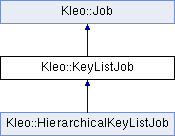#include <keylistjob.h>

Signals | |
| void | nextKey (const GpgME::Key &key) |
| void | result (const GpgME::KeyListResult &result) |
 Signals inherited from Kleo::Job Signals inherited from Kleo::Job | |
| void | progress (const TQString &what, int current, int total) |
| void | done () |
Public Member Functions | |
| virtual GpgME::Error | start (const TQStringList &patterns, bool secretOnly=false)=0 |
| virtual GpgME::KeyListResult | exec (const TQStringList &patterns, bool secretOnly, std::vector< GpgME::Key > &keys)=0 |
 Public Member Functions inherited from Kleo::Job Public Member Functions inherited from Kleo::Job | |
| virtual void | showErrorDialog (TQWidget *parent=0, const TQString &caption=TQString()) const |
| virtual TQString | auditLogAsHtml () const |
| virtual GpgME::Error | auditLogError () const |
| bool | isAuditLogSupported () const |
Protected Member Functions | |
| KeyListJob (TQObject *parent, const char *name) | |
 Protected Member Functions inherited from Kleo::Job Protected Member Functions inherited from Kleo::Job | |
| Job (TQObject *parent, const char *name) | |
Additional Inherited Members | |
 Public Slots inherited from Kleo::Job Public Slots inherited from Kleo::Job | |
| virtual void | slotCancel ()=0 |
Detailed Description
An abstract base class for asynchronous key listers.
To use a KeyListJob, first obtain an instance from the CryptoBackend implementation, connect the nextKey(), progress() and result() signals to suitable slots and then start the key listing with a call to start(). This call might fail, in which case the KeylistJob instance will have schedules it's own destruction with a call to TQObject::deleteLater().
During keylisting, you will receive new key objects through the nextKey() signal as they arrive. After result() is emitted, the KeyListJob will schedule it's own destruction by calling TQObject::deleteLater().
Definition at line 65 of file keylistjob.h.
Member Function Documentation
◆ start()
|
pure virtual |
Starts the keylist operation.
pattern is a list of patterns used to restrict the list of keys returned. Empty patterns are ignored. If pattern is empty or contains only empty strings, all keys are returned (however, the backend is free to truncate the result and should do so; when this happens, it will be reported by the reult object).
If secretOnly is true, only keys for which the secret key is also available are returned. Use this if you need to select a key for signing.
Implemented in Kleo::HierarchicalKeyListJob.
The documentation for this class was generated from the following file:

